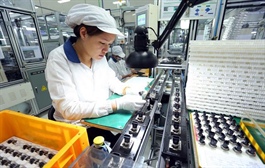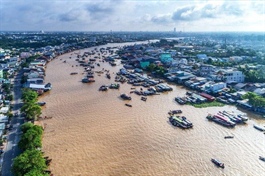Tra Vinh economy showing positive developmental signs
Tra Vinh economy showing positive developmental signs
Tra Vinh has made sustained efforts to boost its economic recovery by wooing investment, disbursing capital resources, and implementing infrastructure projects, which in turn are creating business opportunities.

The Mekong Delta province has sent working groups to promote investment in the neigbouring provinces of Ben Tre, Bac Lieu, Hau Giang, An Giang, and Kien Giang. In particular, it successfully held the Investment, Trade, and Tourism Promotion Conference 2022, where it signed MoUs with 14 investors to implement 20 projects in the locality.
In the first six months of 2022, Tra Vinh attracted five local investment projects registered at $583.5 million. The province had 268 newly-registered businesses, fulfilling 53.6 per cent of the target, which was 74 more than during the same time last year.
Under the socioeconomic development and recovery programme, as of June 28, the province has disbursed $4.17 million out of $11 million, and it has generated new employment for 13,520 people and sent nearly 450 people overseas for work.
Meanwhile, special attention has been paid to community healthcare, and relief policies have been carried out in a timely manner. The province has also kept track of its COVID-19 vaccination progress: as of July 2, it has administered 2.3 million vaccine jabs, fulfilling 99.3 per cent of the allocated doses.
Another key achievement is that Tra Vinh successfully celebrated the 30th anniversary of the province’s re-establishment. Meanwhile, the locality has also realised its goals to promote trade and tourism. A project on modernising the irrigation system to serve sustainable agricultural development in the Mekong Delta was approved in 2020. Tra Vinh’s project on investigating and assessing the current status of irrigation infrastructure for agricultural production this decade cost $185.9 million, and covered several categories like 16 dike and embankment construction works and 28 sewer system works.
Other categories include two phases of reservoir along the Lang The River as well as nine irrigation infrastructure works for fisheries across Duyen Hai town, Cau Ngang, Chau Thanh, and Tra Cu districts.
Tra Vinh has also greenlit another important programme on sustainable livelihood transformation to adapt to climate change. The programme will improve management capacity, smart farming, and aquaculture while aiding market access for clean agricultural products. Other goals include boosting the ability to run irrigation systems in various forms to facilitate production amid climate change.
At the same time, the province will upgrade the dike system to prevent high tides on Long Hoa and Hoa Minh islets in Chau Thanh district. Infrastructure will also be developed to transform rice and shrimp farming practices in Thuan Hoa, My Hoa, Hiep My Dong, and Vinh Kim communes in Cau Ngang district. Other focus areas include promoting shrimp farming in the mangrove conservation area in Duyen Hai district and building aquaculture infrastructure in Duyen Hai town.
Most recently, a delegation led by Le Minh Hoan, Minister of Agriculture and Rural Development, held a meeting in Tra Vinh on the development of irrigation systems and sustainable economic models. At the meeting, Tran Truong Giang, director of Tra Vinh Department of Agriculture and Rural Development, proposed the minister give Tra Vinh priority to participate in several projects. First is on restoration and sustainable management of coastal forests in the Mekong Delta to increase climate change resilience. The province is expected to borrow capital from the Asian Development Bank (ADB) to finance the project with the total investment capital of $12.4 million.
The second project is to develop infrastructure to support agriculture in adapting to climate change in the coastal Mekong Delta. It is also expected to borrow capital from the ADB for the project, which has the total investment capital of $47.87 million. Meanwhile, the third project is about integrated climate resilience and livelihood transformation in the Mekong Delta towards sustainable development and prosperity. The province will borrow capital from the World Bank, with the project in total set to cost just under $40 million.
Tra Vinh is also developing more nature-based tourism. The province will promote tourism products to help locals improve their incomes and livelihoods, thereby helping to reduce poverty and end hunger. The province has a plan to roll out special products at some local attractions on Con Chim and Con Ho islets, Con Trung Hamlet, and Khmer Culture and Tourism Village in Chau Thanh district, as well as the Sokfarm agricultural area in Tieu Can district.























